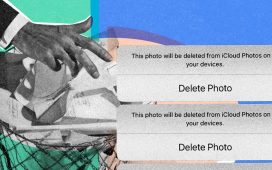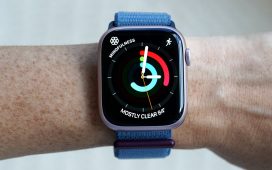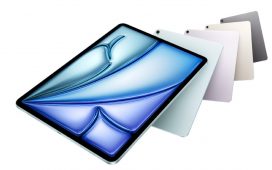When Apple debuted its latest iPad advertisement at a London launch event for its new tablet computers this week, its employees cheered from the balconies of its Foster + Partners-designed offices in Battersea Power Station.
However, the minute-long spot, which showed musical instruments, cameras and artworks being crushed by a giant hydraulic press, could not have prompted a more different reaction from some of its most loyal customers. They were outraged.
To the kinds of creatives who continued to buy Mac computers even when Apple teetered on the brink of bankruptcy in the late 1990s — many of them already anxious about the impact artificial intelligence could have on their craft and careers — the ad seemed unusually tone deaf for a company feted for its marketing prowess.
Little more than 48 hours later, Apple made a rare apology and said it would pull the ad’s planned TV airtime.
But, for even its most dedicated fans, the damage seemed to run deeper than just a misjudged promo.
John Gruber, an Apple blogger and loyalist, wondered if the backlash was the “dead canary in the Apple brand coal mine”.
“Apple’s position in our culture has changed,” he said in a blog post. “They’re no longer, and never again will be, the upstart. They’re The Man now.”
Om Malik, a tech journalist turned Silicon Valley investor, said that the mis-step highlighted how Big Tech companies such as Apple were “doing things that make them less likeable by the day”.
“Apple is no longer making iconic products that are trying to find their place in our lives through clever messaging,” he wrote. “When you are as large as Apple . . . mediocrity of action creeps into every aspect of your business.”
Apple’s huge profits and dominance of the smartphone market have made it one of the world’s most valuable companies. But they have also made the $2.8tn group a target for regulators and rivals, whose claims of Apple’s arrogance and hubris will only be fuelled by this week’s outcry.
It will also amplify concerns that Apple has lost its creative soul since the death of its co-founder Steve Jobs and the departure of several of its top designers in recent years including Sir Jony Ive, at a time when iPhone sales are falling.
Rory Sutherland, vice-chair at ad agency Ogilvy Group, said Apple should have foreseen that customers might misinterpret its ad. “People do not like witnessing wanton destruction. And they especially don’t like seeing beloved analogue creative implements being trashed,” he said.
Apple now finds itself “on the opposite side of the battle lines it created with the famous ‘1984’ ad”, he added, referring to the iconic Super Bowl spot that year that positioned the revolutionary Macintosh overthrowing the oppressive IBM PC.
With Crush, Sutherland said, Apple “was seen as behaving like an all-imposing tech monolith — Big Brother — rather than being on the side of the little guy”.
Apple’s rivals and critics have seized on this opportunity to accuse the company of losing touch with its customers.
Carl Pei, founder of London-based consumer electronics start-up Nothing, said the ad showed how much Apple had changed since the early days of the iPod and iPhone.
“Apple is not creative anymore and maybe that’s just fine,” said Pei, whose smartphones and headphones compete with Apple’s. “They are . . . still innovating a lot on the technology side but perhaps they have lost their warmth and personality?”
In his apology, Tor Myhren, Apple’s vice-president of marketing communications, insisted that “creativity is in our DNA at Apple” and that it always intended to “empower” and “celebrate” its creative customers. “We missed the mark with this video, and we’re sorry,” he said.
Apple’s advertising campaigns have often been held up as the pinnacle of the industry over the past few decades.
Under co-founder Steve Jobs, Apple was lauded for campaigns such as “Think Different” in the 1990s and for the “Silhouette” iPod ads that made its white earphones a status symbol and guaranteed success for their accompanying music, such as Feist’s ‘1-2-3-4’.
However, ad executives say that there have been fewer such moments in the years since the launch of the first iPhone and iPad, with repeated iterations of these basic designs — faster, better camera or thinner — sparking less of the imagination than these earlier, revolutionary products.
These executives said the new ad hit a particularly deadening tone for those in the creative industries already facing a threat to their jobs from AI.
“In a world where the future of creativity is constantly being threatened with extinction,” said Kirsty Hathaway, executive creative director at agency JOAN London, “the metaphorical crushing of creativity and cultural achievements is a stark reminder of exactly how these people are feeling: squished, squeezed and pressurised.”
Apple has been bringing more of its advertising in-house over the past decade, although it retains Omnicom-owned TBWA Media Arts Lab — a dedicated global agency whose only client is Apple — and works with others such as Sir Martin Sorrell’s S4 Capital.
Those in the industry who have worked with Apple say they see few dips in standards at the Silicon Valley group, which swept the Cannes Lions advertising awards last year.
“They are doing more in-house but the attention to quality, design and consistency is close to obsessive,” said one executive who works with Apple.
Those close to the group give credit to Myhren, who reports directly to chief executive Tim Cook: Apple has topped Interbrand’s Best Global Brands every year since Myhren joined in 2016 and has won 105 Cannes Lions awards.
Greg Silverman, global director of brand economics at Interbrand, said this week’s uproar was unlikely to threaten Apple’s position at the top of the consultancy’s rankings. “This is probably more like stepping on a thumb tack than shooting yourself in the foot,” he said.
Ben Wood, tech analyst at CCS Insight, said that a far more “pivotal moment” for Apple was its World Wide Developer Conference next month.
“We have a world obsessed with AI at the moment and Apple has to deliver a response,” he said.









